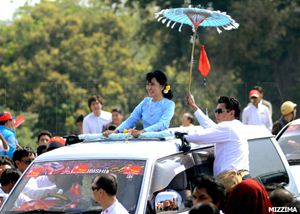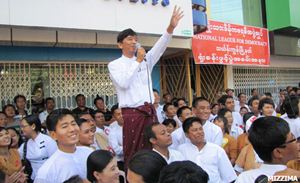At this moment, four people are emerging as strong leaders in the Burmese reform process.
Suu Kyi and Min Ko Naing are already well-known, tried and true leaders in the eyes of the Burmese people.
 President Thein Sein was an unknown factor for the past year as he led the quasi-civilian government after the general election. But as the situation keeps unfolding in the most stunning ways, President Thein Sein, who most Burmese thought was a puppet of Than Shwe, has taken everyone by surprise with his bold changes. His interview in the Washington Post confirmed that Burma has a winner in its new president. Maybe former junta leader Than Shwe did one thing right by assigning Thein Sein to be in charge of the country in its transition to a democratic state.
President Thein Sein was an unknown factor for the past year as he led the quasi-civilian government after the general election. But as the situation keeps unfolding in the most stunning ways, President Thein Sein, who most Burmese thought was a puppet of Than Shwe, has taken everyone by surprise with his bold changes. His interview in the Washington Post confirmed that Burma has a winner in its new president. Maybe former junta leader Than Shwe did one thing right by assigning Thein Sein to be in charge of the country in its transition to a democratic state.
The president may appear to be an unassuming person, but that could be his greatest strength, given his ability to be patient, to listen and to be fearless in doing the right thing. It shows he is a self-empowered person who seems to possess a combination of wisdom and courage that we rarely see in ex-generals.
Burma is lucky to have him as the titular head of the country during this most challenging and critical time. He has proven to be adroit in walking on the perilous razor's edge between the hardliners, the democratic forces and a freedom-starved and poverty stricken population. He has a huge role to play in leading Burma out of its economic and political quagmire and to move the country forward. He has made the right choices so far in reconciling with Suu Kyi to bring a global legitimacy to the reform process that the army lacks and he has taken risks by freeing Min Ko Naing and his colleagues.
Because the generals swallowed their pride and recognized Suu Kyi, Burma now has a trusted face in the Western world playing a significant role in the drive toward democracy. This is no small matter as she garners deep respect globally and has become an arbiter of the legitimacy of the quasi-elected government.
Then there is Min Ko Naing. Suu Kyi can serve as a statesman and opposition parliamentarian, but how does Min Ko Naing fit into the general scheme of things? There are those in Parliament who truly fear his charisma and immense popularity. They fear that he could be elected to Parliament, and that itself speaks to his personal power as a leader.
 In the modern day political history of Burma, there have been only two Burmese leaders who were able to lead the entire nation to rise up against its rulers, Gen Aung San and Min Ko Naing. Some analysts describe Min Ko Naing as a leader of a failed uprising that is in fact a myopic way of looking at the history of Burma. It was Min Ko Naing and his cohorts who risked their lives and cracked open the gates through which Suu Kyi and others were able to craft a path of resistance.
In the modern day political history of Burma, there have been only two Burmese leaders who were able to lead the entire nation to rise up against its rulers, Gen Aung San and Min Ko Naing. Some analysts describe Min Ko Naing as a leader of a failed uprising that is in fact a myopic way of looking at the history of Burma. It was Min Ko Naing and his cohorts who risked their lives and cracked open the gates through which Suu Kyi and others were able to craft a path of resistance.
Their uprising may have failed at the time, but the seed they planted at great costs 23 years ago is now beginning to bear fruit. Sui Kyi is an incidental leader who happened to be in Burma at the right time and the right place.
This is not to reduce or belittle her tremendous role in her quest to free Burma. She and others kept the ideal of democracy alive for the nation while Min Ko Naing and his cohorts were jailed and silenced for 20 years.
Now that Min Ko Naing and his group are preparing to participate in nation building, one hopes the whole group will participate in the 2015 general elections as a political party.
If Min Ko Naing decides not to participate in the election, it will be a huge opportunity lost for the nation. Even if some of his group should get elected without Min Ko Naing, it will be like an army without its commander in chief. No one in his group has his gravitas.
Suu Kyi is now 66. How long can she play her role in politics? The recent episode of her illness on the campaign trail is in fact a wake up call. The NLD greatest weakness is not having other figures in line ready to step in if anything happens to her. The natural process of leadership development was stymied with her incarceration. But luckily for Burma, it has Min Ko Naing and his group who came of age in prison and trained themselves to be politically mature and are even more empowered now than before. They are without a doubt the next leaders in line to back up Suu Kyi as figures who can represent a powerful democratic force.
Min Ko Naing has expressed no interest in party politics and has said that since Sui Kyi will be in Parliament, he would rather be outside working to build up the country in other ways.
The nation cannot afford to depend on Suu Kyi alone. Can the NLD build up a group of 20 mature and solid politicians like Min Ko Naing's group in three years? It took nearly a quarter of a century and 20 years of imprisonment to create this amazing group of young men who are battle-hardened politicians ready to go to work for Burma’s people. They are a powerful group collectively, and they will bring a huge momentum that must be channeled towards real change in the body politic.
It's imperative that the democratic forces in Parliament must be built up if the Constitution is to be rewritten as needed. Imagine having a powerful group of reform leaders in Parliament: President Thein Sein, Lower House Speaker Shwe Mann, Suu Kyi and Min Ko Naing and his cohorts. It will reboot the parliamentary reform process after the 2015 election if Min Ko Naing and his group are elected.
President Thein Sein should realize that his reform faction needs Min Ko Naing in Parliament, if the president really wants to energize the whole country to more forward with the reform process.
Burma’s future depends on not just one single powerful leader, but a powerful collective leadership from the ex-military faction represented by President Thein Sein and Speaker Shwe Mann, and civilian political leaders like Suu Kyi and Min Ko Naing, each with their own given roles and spheres of influence. To turn a dictatorship into a democratic nation, it is imperative that there are powerful leaders to work together to undo the half-century of dictatorship and flawed governance. Min Ko Naing and Suu Kyi together in Parliament will be an enormous force to reckon with.
They will empower the opposition bloc and bring incredible leverage and bargaining power to the powerful bloc of ex-military, democratically oriented parliamentarians.
Min Ko Naing must not sit out the 2015 election. Burma needs him in Parliament working together with Suu Kyi. While in Parliament, they can continue their work in building civil society through a wide network of fellow MPs scattered across Burma.



